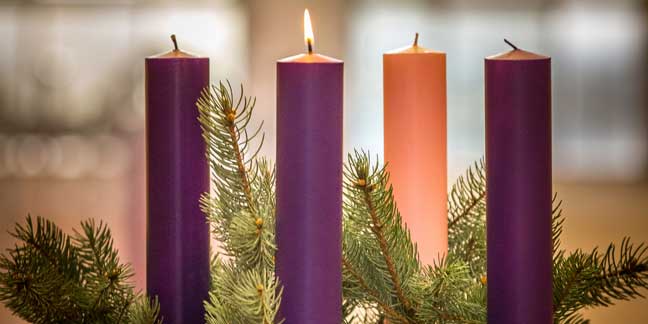Advent is a time of penance and conversion, but is also characterized by Messianic hope: our penance and conversion reflect a good work that is already underway, a good work that is about to experience a boost and a means to bear fruit in the birth of Our Lord at Christmas. As St. Paul describes it in today’s Second Reading: “the one who began a good work in you will continue to complete it until the day of Christ Jesus.” Our Lord enables us to definitively leave our sinful past and ways behind, and that is a cause for joyful hope.
In today’s First Reading Baruch reminds Israel that the Lord is coming to help smooth the way so that they can return to Jerusalem in triumph. The Lord had taken Israel from being a nomadic people wandering in the desert (Abraham) to the Chosen People in the Promised Land, a nation. Their sins drove them into exile and scattered them again, and refugees don’t have the luxury of dressing in their “Sunday best.” Baruch encourages Israel to foresee the moment when they’ll cast aside the rags of their affliction and dress in their “Sunday best” because the Lord is bringing them back to Jerusalem.
The peaks and valleys that make any journey more difficult will be leveled to pave the way for a people that were once exiled and defeated, but now are victorious thanks to the Lord. Even as they were exiled the Lord promised through his prophets to bring them out of the desert and back into their Land again. Salvation was underway even then. Advent reminds us that salvation is underway and has been from all eternity, culminating in the Incarnation and Birth of Our Lord Jesus Christ.
In today’s Second Reading St. Paul reminds us that the good work in us, a work we are trying to capitalize on in Advent, wasn’t started by us, but it can be finished by us, for good or for ill. The Lord from all eternity wanted us to be gathered around his Son before him in Heaven. Adam, Eve, then we blew it. Our Lord came to deliver us from our predicament, but the Holy Spirit was working in our hearts long before that, nudging us toward contrition and conversion for our sins, trying to get us disposed so that the good work could get back on track (in Christ) after we’d derailed it (through our sins).
We received the grace of redemption at Baptism, Paul encourages us today to trust in Our Lord and trust that the good work of redemption will reach its completion thanks to him. Our redemption is underway. It’s not finished yet. Paul also reminds us that the work of redemption is a work of God’s love: it wants to spark something in us, a love that burns all secondary and disordered loves away. Through that good work the Lord’s love reaches out to us, and, straining toward his, our love reaches out to him. His love reached out to us first, and it continued to reach out to us after we’d sinned and continues to reach out to us whenever we reject it by sinning.
In today’s Gospel John the Baptist is mobilized to get the word out that the Lord is coming to lead anyone to salvation who wants it. Today’s Gospel said the “word of God” came to him, something prophetic. God addresses his word to his prophet to set something good into motion. At that moment, just as in Advent, the good work was simply an announcement: the Lord is coming, get ready. The way to get ready was to receive John’s baptism (a gesture of repentance, not the Baptism we’ve received that was instituted by Christ) and seek forgiveness for our sins. We could never extricate ourselves from the consequences of our sins alone: John is announcing that the Lord will pave the way for our forgiveness and our conversion. The Lord is coming within reach. We need to start reaching out to him during Advent.
The holiday season is a special time for reaching out in a special way to those in need, whether spiritually or materially. Outreach literally means “reaching out.” Helping the poor is always important. Reaching out to reconcile with those with whom we’re estranged is also a beautiful way to welcome Our Lord at Christmas. Reaching out to those who are lonely, those whose family is far away, or those coping with loss. Reaching out to that irascible person who is difficult to get along with, getting under that crusty armor to discover who they truly are and show that you “get it.” You may not need to go very far. Some of these people you might even find in the privacy of your own home or family.
Readings: Baruch 5:1–9; Psalm 126:1–6; Philippians 1:4–6, 8–11; Gospel Luke 3:1–6. See also 2nd Sunday of Advent, Cycle C.





